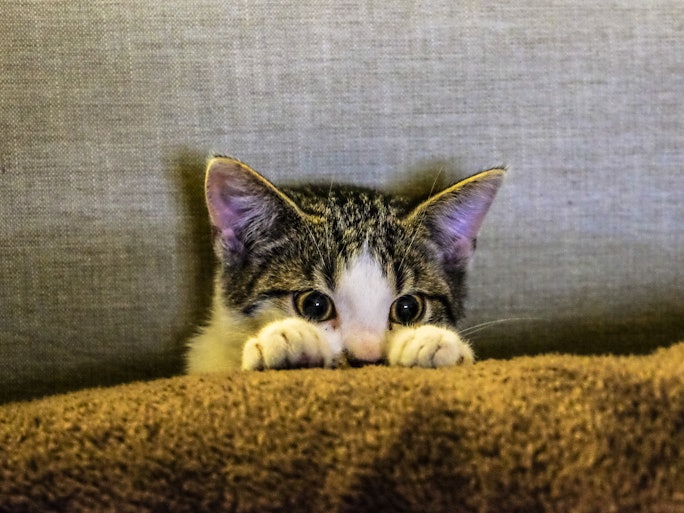People have been using the "crazy cat lady" disease as an excuse to hate on the internet's favorite animal for decades, but does toxoplasmosis actually make you like cats?
That's the question asked by a TED-Ed video, and the answer may make
even the staunchest feline enthusiast eye their cat with suspicion. And
then shrug and pour them a glass of kitty wine, because you're already in too deep — you might as well commit to the role.
Researchers have been aware of the existence of Toxoplasma gondii, a parasite found in cat feces, for decades. Although it can pose major problems for people with weakened immune systems, healthy people are generally capable of fighting it off without experiencing more than mild flu-like symptoms. Once the initial symptoms are over, the protozoan was believed to go into a dormant stage in the brain. It's creepy to think about, but relatively harmless — or so researchers used to think.
Recent studies have found that T. gondii may actually be capable of influencing its host, and if you've lived around a cat, that probably includes you. Researchers have found evidence of toxoplasmosis, the disease caused by infection with T. gondii, in ancient Egyptian mummies, and at least 60 million people in the United States alone are estimated to be infected today.
As host Jaap de Roode explains in the TED-Ed video, parasites depend on their hosts to live and reproduce. T. gondii's life cycle involves a complicated ladder of cats, mice, and other mammals, including humans. Brace yourself — things are about to get a little gross: The parasite can only reproduce sexually inside cat intestines. Known as oocysts, the offspring exit the cat's body through its feces, where they're likely to be ingested by mice or some other animal. Once inside the mouse, the oocysts mature into adult T. gondii. If its host is eaten by a cat, this new generation of T. gondii takes up residence in the intestines and reproduces again.

Cats and rodents are the major parts of its life cycle, but humans play a role, too. People can become infected in all kinds of ways — litter boxes, contaminated produce, and so on — and research has shown that toxoplasmosis does affect us. The disease has been connected to psychological disorders like schizophrenia, obsessive compulsive disorder, and bipolar disorder; according to the video, it also slows reaction times, just like an infected mouse.

Images: Ghost Presenter/Pexels, TED-Ed/YouTube (2)
source
Researchers have been aware of the existence of Toxoplasma gondii, a parasite found in cat feces, for decades. Although it can pose major problems for people with weakened immune systems, healthy people are generally capable of fighting it off without experiencing more than mild flu-like symptoms. Once the initial symptoms are over, the protozoan was believed to go into a dormant stage in the brain. It's creepy to think about, but relatively harmless — or so researchers used to think.
Recent studies have found that T. gondii may actually be capable of influencing its host, and if you've lived around a cat, that probably includes you. Researchers have found evidence of toxoplasmosis, the disease caused by infection with T. gondii, in ancient Egyptian mummies, and at least 60 million people in the United States alone are estimated to be infected today.
As host Jaap de Roode explains in the TED-Ed video, parasites depend on their hosts to live and reproduce. T. gondii's life cycle involves a complicated ladder of cats, mice, and other mammals, including humans. Brace yourself — things are about to get a little gross: The parasite can only reproduce sexually inside cat intestines. Known as oocysts, the offspring exit the cat's body through its feces, where they're likely to be ingested by mice or some other animal. Once inside the mouse, the oocysts mature into adult T. gondii. If its host is eaten by a cat, this new generation of T. gondii takes up residence in the intestines and reproduces again.

Because mice tend to avoid cats by nature, T. gondii finds its
way to the host's brain to tinker with its behavior: Infected rodents
show less fear of predators, slower reaction times, and ironically, are
more attracted to feline urine. This makes it more likely to get snapped
up by Fluffy down the road. Researchers aren't sure how T. gondii
manages to influence its host so dramatically, but the prevailing
thought is that the parasite is able to mess with neurotransmitters like
dopamine.
Cats and rodents are the major parts of its life cycle, but humans play a role, too. People can become infected in all kinds of ways — litter boxes, contaminated produce, and so on — and research has shown that toxoplasmosis does affect us. The disease has been connected to psychological disorders like schizophrenia, obsessive compulsive disorder, and bipolar disorder; according to the video, it also slows reaction times, just like an infected mouse.

So is T. gondii the reason some people are so drawn to cats?
There's no definite answer just yet, but it's not like you can do
anything about it anyway. Now go stare adoringly at your cat, but not
until you've watched the video.
Images: Ghost Presenter/Pexels, TED-Ed/YouTube (2)
source

No comments:
Post a Comment